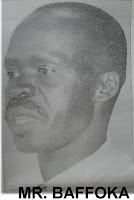
We write about people. We write about things that were done, things that are not done and things that will be done. We write in order to expose evils and correct malpractices.
We write to expose injustices suffered by the masses. It is about values to hold on to, things to reach for, experiences familiar, things forgotten or things slipping out of our hands.
Writing deals with issues of democracy, cultural invasion, human rights violation, dictatorship, gender issues and corruption. These issues are political. So I can say here that writing is intrinsically a political activity.
The second question is why few writers deliberately enter the political arena; to me, it’s not fair.
A writer is an educator, a healer, an explainer, a portrayer, a prophet, an examiner of all aspects of society. For a writer to accomplish all this, he need not be in the centre, rather, he should be at the edge so as to have a clear view of what goes on in the political arena. So, entering the political arena will lead to subjectivity and bias in one’s work.
It will also offer a narrow view of the whole society. The writer will not have a wider scope for exercising his creative work. Deliberately entering the political arena will deprive him the chance of being an educator, an observer and an explainer - for instead of being an observer, a writer will be the observed.
A writer is a judge, is a referee whose role is to examine society consciously and carefully and judge events that happen in the society.
This must be done without favouritism. The writer must report exactly what happened, is happening and will happen in the society.
A writer has to portray both the good and evil, the ugly and beautiful without being biased. This requires that a writer should be objective, if he is to judge the society without siding with any group.
Assuming a political career will make a writer blind a bit for he has to pay allegiance to his party and mould his effort to advance his party’s objectives. Now, this will result into bias and lack of objectivity for it is true that one would not oppose from within.
The other question is political instability and literary production. Yes. Political instability stimulates literary production. I come from a country, until yesterday, where the political situation was very horrible. Political instability leads to social and economic instability, human rights abuse, political intimidation, oppression, corruption and undemocratic system of government.
The human mind is a bit relaxed and slow to function when things are normal but as soon as problems hit, then the mind works very fast in order to find solutions to the problems. So, political instability very much stimulates literary production because this instability brings with it social instability, economic instability, human rights abuse, and all that.
And writers will work to put things right by criticising, opposing, enlightening and educating the masses and correcting the wrongs.
They will be stimulated to make their views, and offer advice so that their voices and the voices of the masses are heard.
All my works have got political overtones. And that’s one reason as to why up to now, my works are not published in my own country. The other question is, can writers effectively resist political tyranny? Writing of any nature is likely to meet opposition from some group of the larger society. If you look at our continent, it is by and large an undemocratic continent where freedom of expression is denied to the people.
Even in the few so-called democratic countries in Africa, one is not free to write on issues of immediate concern to the society.
So history is full of battles between writers and cruel governments in Africa, which in many times end in imprisonment and persecution of writers. The question then is, should writers bow to the corrupt and cruel regimes and stop being the voices of the masses? I think not.
Now, this demands that writers should bear the cross and be prepared to face the worst with their arms open if they are to resist political tyranny and bring about change.
Published in Daily Monitor, October 30, 2005.

